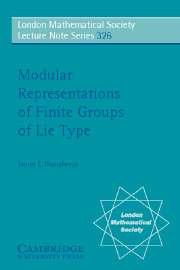Book contents
- Frontmatter
- Contents
- Preface
- 1 Finite Groups of Lie Type
- 2 Simple Modules
- 3 Weyl Modules and Lusztig's Conjecture
- 4 Computation of Weight Multiplicities
- 5 Other Aspects of Simple Modules
- 6 Tensor Products
- 7 BN-Pairs and Induced Modules
- 8 Blocks
- 9 Projective Modules
- 10 Comparison with Frobenius Kernels
- 11 Cartan Invariants
- 12 Extensions of Simple Modules
- 13 Loewy Series
- 14 Cohomology
- 15 Complexity and Support Varieties
- 16 Ordinary and Modular Representations
- 17 Deligne–Lusztig Characters
- 18 The Groups G2(q)
- 19 General and Special Linear Groups
- 20 Suzuki and Ree Groups
- Bibliography
- Frequently Used Symbols
- Index
6 - Tensor Products
Published online by Cambridge University Press: 23 November 2009
- Frontmatter
- Contents
- Preface
- 1 Finite Groups of Lie Type
- 2 Simple Modules
- 3 Weyl Modules and Lusztig's Conjecture
- 4 Computation of Weight Multiplicities
- 5 Other Aspects of Simple Modules
- 6 Tensor Products
- 7 BN-Pairs and Induced Modules
- 8 Blocks
- 9 Projective Modules
- 10 Comparison with Frobenius Kernels
- 11 Cartan Invariants
- 12 Extensions of Simple Modules
- 13 Loewy Series
- 14 Cohomology
- 15 Complexity and Support Varieties
- 16 Ordinary and Modular Representations
- 17 Deligne–Lusztig Characters
- 18 The Groups G2(q)
- 19 General and Special Linear Groups
- 20 Suzuki and Ree Groups
- Bibliography
- Frequently Used Symbols
- Index
Summary
Apart from their intrinsic interest, tensor products of simple modules—or related modules such as Weyl modules—play a significant role in the study of projective modules and extensions: see Chapters 9, 10, and 12 below.
We begin by outlining some natural problems in 6.1. To deal with these, one typically has to study tensor products first for G and then adapt the results to G = GF using Proposition 5.1. In practice only some special highest weights lead to reasonable computations. In 6.2 we consider briefly the algorithmic computation of composition factor multiplicities, with reference to some special cases worked out in the literature. We also look at several more narrowly focused questions on tensor products, e.g., when is a tensor product of two (nontrivial) simple modules also simple (6.3) or semisimple (6.4)?
In the remainder of the chapter, we derive a precise formula (Theorem 6.9) for the multiplicity of the Steinberg module in a tensor product of simple KG-modules. This depends only on standard character data for G and will be an essential ingredient in the later study of projective modules in Chapters 9–10.
Tensor Products of Simple Modules
Given two simple KG-modules L(λ) and L(μ), what can be said about the structure of L(λ) ⊗ L(μ)? Here are a few natural questions, for a pair of weights λ, μ ∈ Xr.
- Type
- Chapter
- Information
- Modular Representations of Finite Groups of Lie Type , pp. 53 - 60Publisher: Cambridge University PressPrint publication year: 2005



